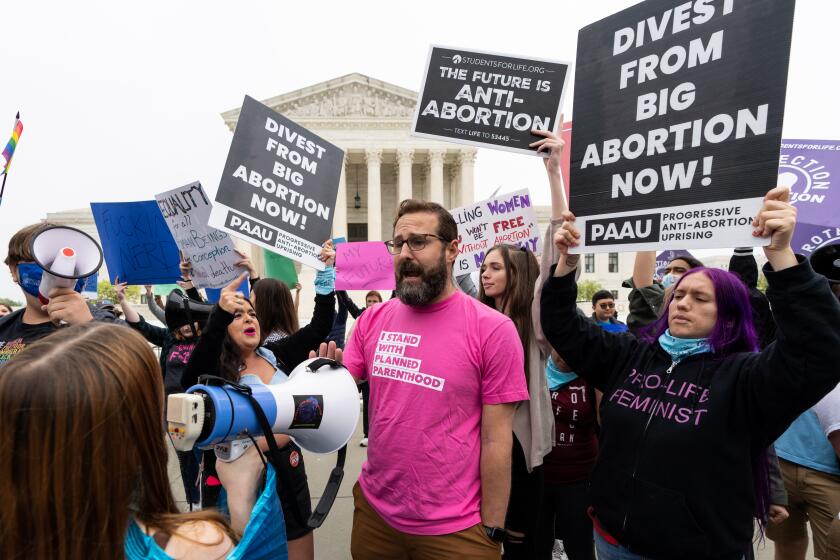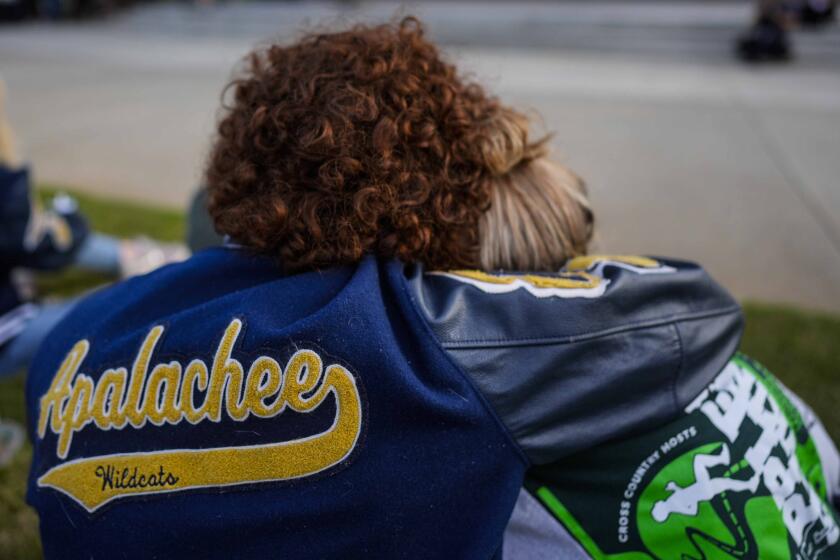Away from Wisconsin’s Capitol, less shouting and more opinions
Sixty miles east of the shouting at the state Capitol in Madison — in a coffee shop called the Steaming Cup — people take a more nuanced view of the protracted political fight that has made their state a center of national attention.
The Steaming Cup is a mom-and-pop shop where brightly colored walls are lined with pictures of motorcycles, a homage to owner Kerry Mackay’s long employment with Harley-Davidson, headquartered in nearby Milwaukee. It draws a cross-section of the population in the seat of one of Wisconsin’s most Republican counties.
But even in a conservative bastion, there were as many opinions on Republican Gov. Scott Walker’s budget repair bill as people in the room. The bill, which would severely limit or eliminate collective bargaining for most public employees, prompted 14 Democratic state senators to flee to Illinois to deny the Republican majority a quorum, and spurred thousands of union supporters to protest at the Capitol, inside and out.
Recall campaigns have sprouted on all sides, and Senate Republicans voted to call on police to drag their absent colleagues back to Madison.
Sipping coffee last week in Waukesha, friends razzed each other about their differing views on the anti-union bill and the man behind it.
Greg Martinich, 56, a Waukesha city employee, nodded at his friends across the table. “They like him. I think he’s like Moammar Kadafi,” Martinich said.
Sitting across from him, 88-year-old World War II veteran and retired salesman Charles Franzke countered, “That guy is ignorant, but I can’t help it.”
Next to Martinich, Van Mehlos, 59, a private security officer, piped up: “Cops for labor!” — echoing the placards that many police union members bore at rallies in Madison.
Waukesha County gave Walker two and a half times the votes it gave his Democratic rival, Tom Barrett, in November’s election. The city of Waukesha is more liberal than outlying areas, but its state legislative delegation is Republican, and its representative in Congress is F. James Sensenbrenner Jr., a Republican best known for his initiatives against illegal immigration and his leadership role in President Clinton’s impeachment.
Despite having strong views, neither Martinich nor Franzke has traveled to the Capitol to demonstrate. And although they disagreed on the question of collective bargaining rights, both agreed that unions held too much political influence through their political contributions. And both wanted to see the missing Democrats come home.
“I go to work every day. I think they should too. I understand why they’re doing it, but I don’t think it’s right,” Martinich said. Franzke called the Democrats “chicken.”
William Mackay, 77, a retired union machinist and father of the coffee shop’s owner, stopped by the table for a moment.
“I think the Democratic senators leaving the state did the only thing they could,” he said.
At the next table over, retired GE engineer Doug Rohrs, 71, said he supported the collective bargaining provisions in the budget repair bill but blamed Republicans as much as Democrats for the impasse. A self-proclaimed political independent, Rohrs said he despised House Minority Leader Nancy Pelosi (D-San Francisco) but voted for Barack Obama, which caused at least one neighbor to stop speaking to him.
“I object in general to public employee unions because they tend to force what they want, and the government has no other option than to force the public to pay for it,” he said.
But Rohrs called it disingenuous of Republicans to slip the collective bargaining issue into a budget bill.
A couple of tables over sat Tom Fowler, 78, from the village of Wales, a former state Department of Transportation employee who was a union member, but not by choice.
“I personally think the governor’s doing a good job — the money tree has got to come to an end,” he said.
The shades of opinion echo complexities found in recent polls. A Rasmussen Reports survey of likely Wisconsin voters found that a majority of respondents opposed taking away collective bargaining rights and supported Democrats and unions over Walker. But a plurality supported pay cuts for state workers and believed public employee unions had too much influence on politics.
Whatever their stance on the legislation, people in the Steaming Cup said they were sick of the impasse.
“I’d like to see a compromise,” said Mehlos, the security officer. “I would just like to see the state Legislature find some common ground.”
Sixty miles west in Madison, the shouting went on.
More to Read
Sign up for Essential California
The most important California stories and recommendations in your inbox every morning.
You may occasionally receive promotional content from the Los Angeles Times.











